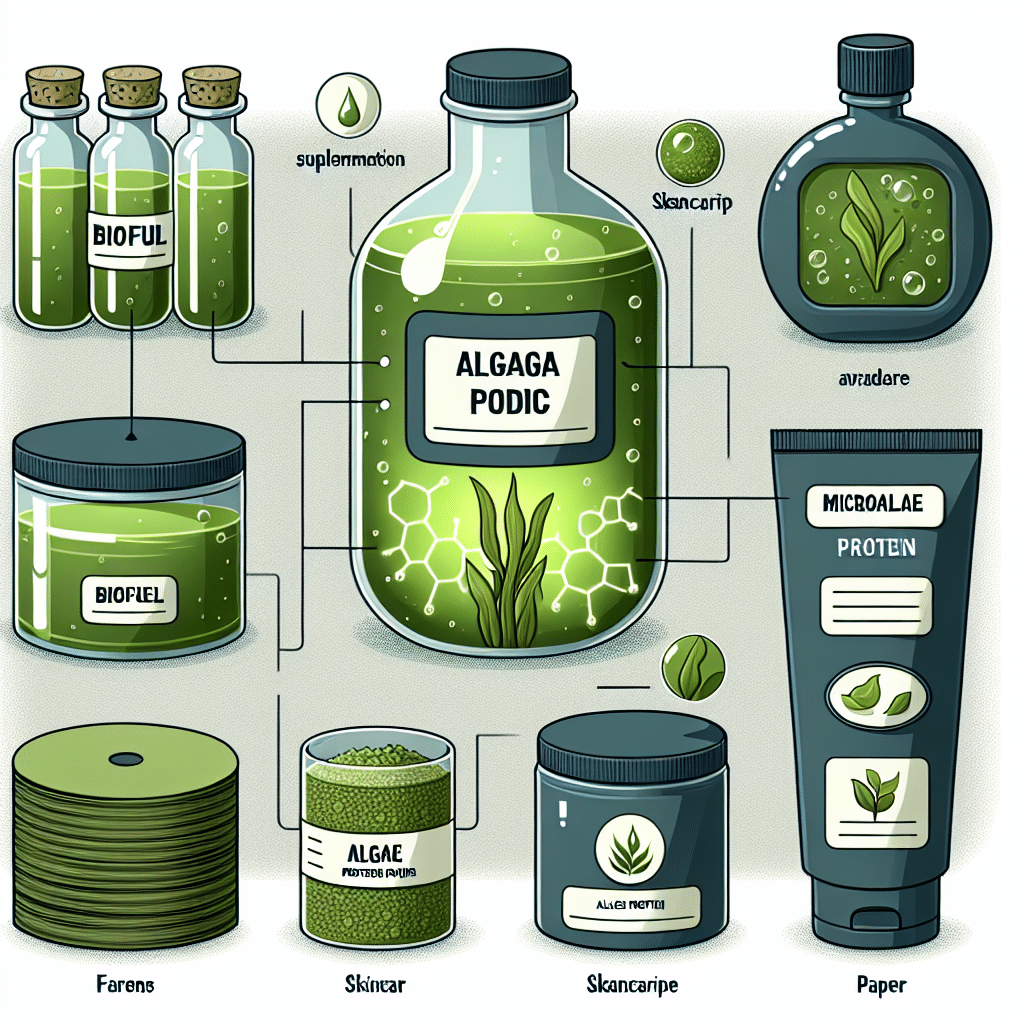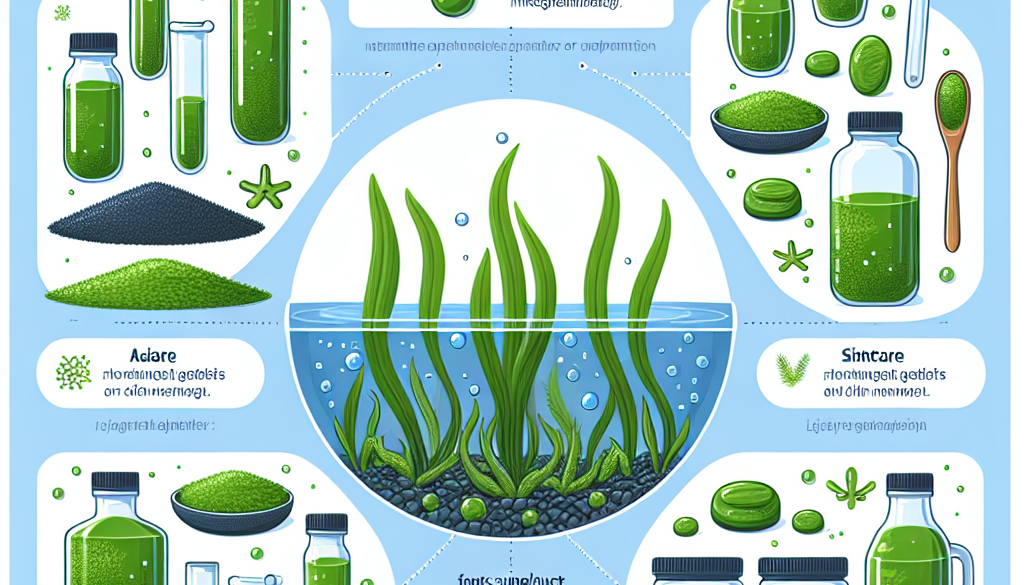What Products Are Made From Microalgae?
-
Table of Contents
Microalgae: The Green Gold for Sustainable Products

Microalgae, often referred to as the green gold of biotechnology, are microscopic algae typically found in freshwater and marine systems. They are capable of performing photosynthesis and are considered one of the most promising resources for a range of sustainable products. Microalgae have garnered significant attention due to their ability to grow rapidly, their high per-acre yield compared to terrestrial crops, and their rich composition of valuable compounds. In this article, we will explore the diverse array of products derived from microalgae and their potential impact on various industries.
Health and Nutritional Supplements
One of the most well-known applications of microalgae is in the health and nutrition sector. Microalgae such as Spirulina and Chlorella are packed with proteins, vitamins, minerals, and antioxidants, making them popular as dietary supplements. These supplements come in various forms, including tablets, powders, and capsules, and are touted for their health benefits, such as boosting the immune system, reducing inflammation, and improving digestive health.
- Omega-3 Fatty Acids: Microalgae are a primary source of omega-3 fatty acids, particularly eicosapentaenoic acid (EPA) and docosahexaenoic acid (DHA), which are essential for human health. Algal-based omega-3 supplements are a sustainable alternative to fish oil, especially for vegetarians and vegans.
- Antioxidants: Astaxanthin, a powerful antioxidant found in the microalga Haematococcus pluvialis, is used in supplements to support skin health, eye health, and athletic performance.
Food and Beverage Additives
Microalgae are increasingly being used as natural colorants and flavor enhancers in the food and beverage industry. Their pigments, such as chlorophyll, phycocyanin, and carotenoids, not only impart vibrant colors but also offer nutritional benefits.
- Natural Colorants: Phycocyanin, derived from Spirulina, is a blue pigment used in confectionery, ice creams, and beverages. It is a natural alternative to synthetic dyes.
- Protein-Rich Ingredients: Algal protein is gaining popularity as a plant-based protein source for food products, including meat substitutes, protein bars, and shakes.
Animal Feed and Aquaculture
Microalgae serve as a high-quality feed ingredient for livestock, poultry, and especially in aquaculture. They provide essential nutrients that promote growth, improve immune response, and enhance the quality of animal products.
- Aquaculture Feed: Microalgae like Spirulina are used in fish and shrimp feed to improve coloration, boost survival rates, and enhance nutritional value.
- Livestock Feed Supplements: Adding microalgae to livestock feed can increase the content of omega-3 fatty acids in dairy and meat products.
Skincare and Cosmetics
The cosmetic industry values microalgae for their rich composition of vitamins, minerals, and antioxidants. These compounds have protective and nourishing properties that are beneficial for skin health.
- Anti-Aging Products: Microalgae extracts are used in creams and serums for their anti-aging properties, helping to reduce the appearance of wrinkles and fine lines.
- Moisturizers: The hydrating properties of microalgae make them suitable for moisturizers and masks, providing deep hydration and improving skin texture.
Energy and Biofuels
Microalgae have emerged as a promising feedstock for renewable energy, particularly biofuels. They can produce lipids, which can be converted into biodiesel, and their carbohydrate content can be fermented to produce bioethanol.
- Biodiesel: Certain strains of microalgae have high lipid content, which can be extracted and transesterified to produce biodiesel.
- Bioethanol: The carbohydrates in microalgae can be fermented to produce bioethanol, a sustainable alternative to fossil fuels.
Environmental Applications
Microalgae play a significant role in environmental sustainability through carbon capture and wastewater treatment.
- Carbon Capture: Microalgae can absorb carbon dioxide from industrial emissions, reducing greenhouse gas levels in the atmosphere.
- Wastewater Treatment: Microalgae can remove nutrients and pollutants from wastewater, making it a cost-effective and eco-friendly treatment option.
Conclusion
Microalgae are a versatile and sustainable resource that can be transformed into a wide array of products across various industries. From health supplements to biofuels, the potential applications of microalgae are vast and continue to expand as research advances. The cultivation of microalgae not only provides valuable products but also contributes to environmental sustainability through carbon capture and wastewater treatment. As the demand for eco-friendly and natural products grows, microalgae stand out as a key player in the green economy.
Discover ETprotein’s High-Quality Protein Products
If you’re interested in incorporating high-quality protein products into your diet or product line, consider ETprotein’s offerings. ETprotein specializes in producing and supplying organic bulk vegan proteins and L-(+)-Ergothioneine (EGT) with a focus on purity and sustainability. Their product range includes organic rice protein, pea protein, and various seed proteins, catering to the nutraceutical, pharmaceutical, and food and beverage industries. For more information or to sample their products, please contact ETprotein.
About ETprotein:
ETprotein, a reputable protein and L-(+)-Ergothioneine (EGT) Chinese factory manufacturer and supplier, is renowned for producing, stocking, exporting, and delivering the highest quality organic bulk vegan proteins and L-(+)-Ergothioneine. They include Organic rice protein, clear rice protein, pea protein, clear pea protein, watermelon seed protein, pumpkin seed protein, sunflower seed protein, mung bean protein, peanut protein, and L-(+)-Ergothioneine EGT Pharmaceutical grade, L-(+)-Ergothioneine EGT food grade, L-(+)-Ergothioneine EGT cosmetic grade, L-(+)-Ergothioneine EGT reference grade and L-(+)-Ergothioneine EGT standard. Their offerings, characterized by a neutral taste, non-GMO, allergen-free attributes, with L-(+)-Ergothioneine purity over 98%, 99%, cater to a diverse range of industries. They serve nutraceutical, pharmaceutical, cosmeceutical, veterinary, as well as food and beverage finished product distributors, traders, and manufacturers across Europe, USA, Canada, Australia, Thailand, Japan, Korea, Brazil, and Chile, among others.
ETprotein specialization includes exporting and delivering tailor-made protein powder and finished nutritional supplements. Their extensive product range covers sectors like Food and Beverage, Sports Nutrition, Weight Management, Dietary Supplements, Health and Wellness Products, and Infant Formula, ensuring comprehensive solutions to meet all your protein needs.
As a trusted company by leading global food and beverage brands and Fortune 500 companies, ETprotein reinforces China’s reputation in the global arena. For more information or to sample their products, please contact them and email sales(at)ETprotein.com today.












